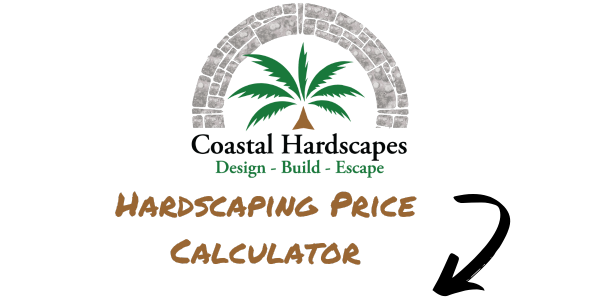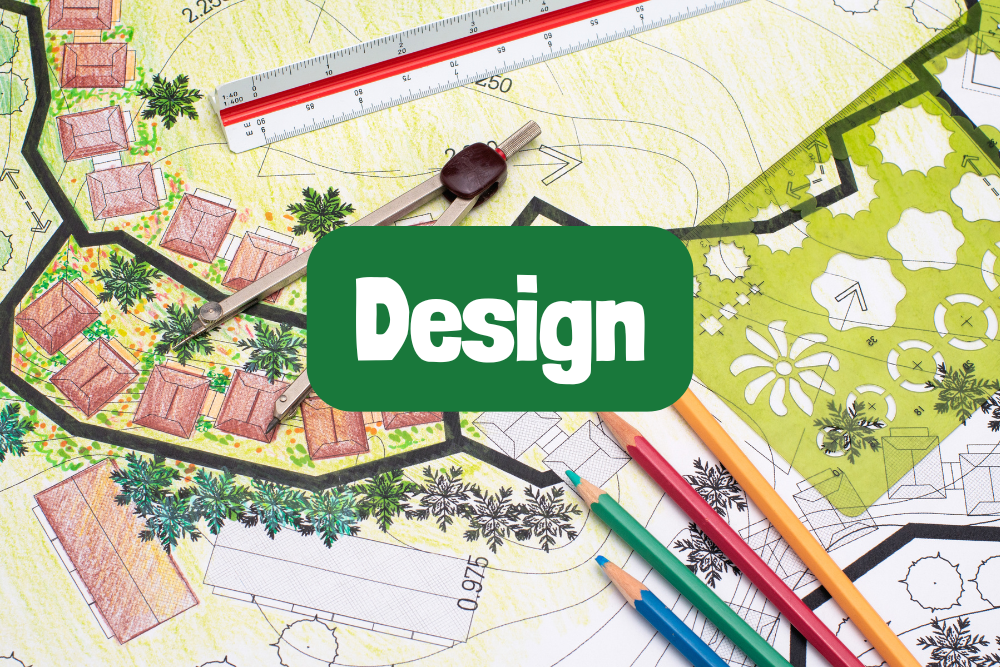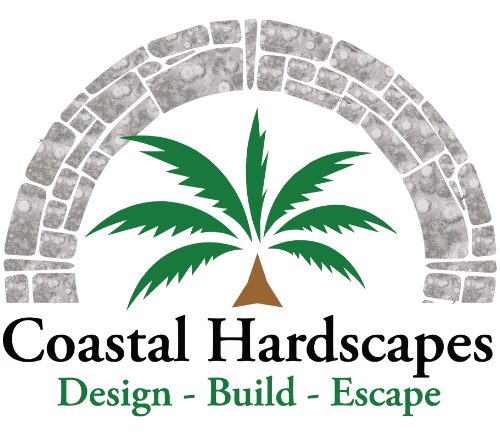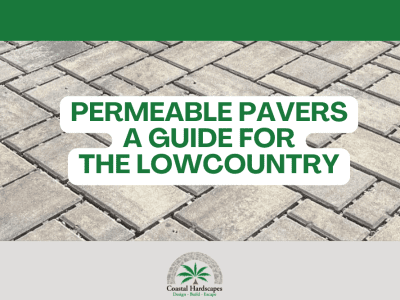Do you live in Savannah or the Lowcountry and want to learn more about permeable pavers? If so, you’re at the right place!
The team at Coastal Hardscapes of Georgia will share with you the pros and cons of permeable pavers, also known as permeable paving, as well as why they’re an excellent fit for patio projects, walkways, driveways, and even parking lots in the Lowcountry.
First, what are permeable pavers?
The term permeable can be defined as “allowing liquid through.” So when a resident of Bluffton, SC, or Pooler, GA, is looking to add a new patio or perhaps a Savannah business wants to renovate their parking lot, pereamble pavers are superb for the Lowcountry because of the stormwater and drainage solutions they offer.
Mimicking the natural process that occurs when rain or stormwater falls, pereamble pavers are a segmental system that allows water to pass through the paver joints and seep or displace naturally below. Instead of water collecting on top of the surface and requiring a drainage solution, a permeable paving solution (more on this) will help manage surface runoff while adding curb appeal.
Permeable pavers resemble typical patio pavers, but the joints are exposed to the gravel base below, allowing for the management of surface runoff during heavy storms.
Why are permeable pavers suitable for Lowcountry residents?

If you have lived in the Lowcountry or Coastal Georgia region for any period of time, you have quickly noticed the afternoon storms. Whether it is the fall hurricane rains or just the Tuesday afternoon thunderstorm, the rain comes down fast and hard.
Managing the surface runoff and water accumulation is a constant battle for both residents and business owners. Water accumulates on paved surfaces and concrete and is often left standing while stormwater management systems take time to displace the water.
However, permeable pavers in Savannah, Bluffton, and Pooler serve as an environmentally friendly option for patio and walkway solutions. Considering hardscape design and aesthetics, permeable paving is the ideal choice to incorporate both sustainability and beauty into your next project.
You can utilize pereamble concrete pavers for the following hardscape projects:
- Patios
- Driveways
- Walkways
- Pool decks
- Areas with high foot or car traffic
For landscaping projects that include fire pits or retaining walls, the permeability is not as essential since they do not cover the ground as a surface; instead, they are built vertically.
What is permeable paving?
Permeable paving is an innovative solution that allows rainwater to pass directly through the surface, easing drainage and reducing runoff. Unlike traditional paving, which creates a solid barrier, permeable systems are built with gaps or porous materials that allow water to soak naturally into the ground.
The phrase “Permeable paving” essentially breaks down into terms:
- Permeable = allows liquid through
- Paving = the act of laying down
Most hardscaping companies will refer to paver driveways or new hardscaping design projects as “paving” when installing new pavers. Permeable paving is excellent for large surfaces where including sustainable and eco-friendly solutions is a priority. Additionally, managing rainwater and enhancing curb appeal are essential for coastal residents, which is why permanent solutions can be ideal.
You may notice this permeable paving in various applications around South Carolina and Georgia, including driveways, parking lots, walkways in public parks, and residential properties.
Incorporating permeable paving and minimizing surface runoff helps reduce erosion, lowers the risk of flooding, and alleviates the strain on municipal drainage systems. Furthermore, the cooling effect of the permeable surface can contribute to reducing surface and urban heat.
How much does permeable paving cost compared to regular pavers?
The quick answer to costs is simple: Permeable paver systems often cost about 20-50% more upfront than a comparable non-permeable patio or hardscaping project. Now, let’s take a look at why permeable paving costs more on average than a regular paver or concrete patio.

1. Permeable Paver Base Depth & Quality
Remember the whole permeability and surface runoff talk from above? Here is where the effectiveness starts = the base of the permanent paved area.
You often need a thicker, well‐draining base of crushed stone or aggregate, along with proper compaction, geotextile fabric, and in some cases specialized drainage solutions. To help prevent erosion and also effectively manage the groundwater recharge, the appropriate depth and base must be installed before adding pavers.
2. Site Prep

Hardscaping services go beyond laying pavers; everything from relocating sprinklers to removing existing impervious surfaces (such as grass, dirt, gravel, old asphalt, and concrete) adds to the cost. From there, everything, from grading the area to ensure water drains correctly, to labor costs, contributes to the project’s overall higher price.
Take, for example, replacing a previous driveway. This would mean removing the old materials, disposing of them, and then prepping the area to install the permeable paver base.
3. Special Materials
Permeable‐specific pavers, grids, or turf blocks cost more than other materials such as gravel, concrete, or asphalt. While permeable paver hardscape costs fall in line with a traditional paver patio cost per square foot, the permeable materials, along with the base, are why they cost more than lesser materials.
4. Labor Complexity
The installation of a new permeable paver driveway or patio is more involved and, therefore, more labor-intensive. Everything from aligning pavers with adequate spacing, filling joints correctly, ensuring permeability, and factoring in curb appeal makes labor one of the reasons why pavers cost more. If you noticed above, the downside to permeable paving is that if it is not installed correctly, its performance is hindered. The upside is that while you pay for labor, great install teams in South Carolina and Georgia will create a durable, permeable hardscape surface for years to come!
5. Maintenance Considerations
So far, we have focused on the installation side of things, but with any hardscape and landscape project, maintenance considerations still matter. For a new permeable paver patio or walkway, maintenance may include keeping joints clean, replenishing infill (gravel/sand), vacuum sweeping, and other routine care each year.
Where is permeable paving ideal vs paving/concrete?

Unlike conventional paving materials, which can create a barrier that prevents water from seeping into the ground, permeable paving incorporates gaps or spaces that facilitate the natural absorption of rainwater.
This makes permeable solutions ideal for large driveways, parking lots, walkways, and some patios. A porous pavement driveway or parking lot is something urban planning teams are incorporating to help with surface water in a more environmentally friendly way.
Best Places for Permeable Paving:
- Large driveways that have challenges managing surface runoff during storms
- Parking lots are looking for environmental protection
- Walkways around houses, garages, restaurants, and patios
- Anywhere you have soil erosion, but want to still add hardscaping
- Backyard patios or walkways
- Where do you want to add sustainable hardscape solutions
Now that we know the best fits of permeable pavers, let’s look at some of the pros and cons!
Pros & Cons of Permeable Pavers
For your local landscape and hardscape project here in Savannah, GA, permeable pavers can offer a unique solution for your outdoor space. One of the significant advantages of permeable pavers is their ability to manage stormwater effectively. Unlike traditional paving options that tend to channel rainwater into drainage systems, permeable pavers allow water to seep through their surfaces and into the ground. This not only helps reduce runoff and the risk of flooding but also promotes groundwater recharge, a crucial process for maintaining local ecosystems.
That said, there are also drawbacks to using paver solutions with “permeability,” which can include maintenance and costs. Here are the pros and cons of permeable paving:
| Pros of Permeable Pavers | Cons of Permeable Pavers |
|---|---|
| Effectively manage stormwater by allowing rainwater to seep into the ground | Performance depends heavily on proper installation and soil conditions |
| Reduce runoff and lower the risk of flooding, a sustainable solution | Risk of clogging over time if not maintained properly |
| Promote groundwater recharge, supporting local ecosystems | Higher upfront costs compared to traditional pavers (materials + labor) |
| Available in various styles and colors to enhance the aesthetics of outdoor living spaces | Require regular maintenance to keep pores clear and functional |
| Seamlessly integrate with landscaping and hardscaping designs | Improper base preparation can reduce effectiveness |
One factor always considered with permeable paver patios is furniture. We have had some clients request that the patio joints be sealed, while only allowing permeable gaps in the walkway or surrounding features. The upside is you get to design your own dream oasis when you work with Coastal Hardscapes!
LEED Certification
LEED stands for Leadership in Energy and Environmental Design, a globally recognized green building rating system created by the U.S. Green Building Council (USGBC). The reason we mention this is that, for commercial development purposes, you can apply for LEED credits when installing a permeable paver solution for a parking lot, driveway, walkway, or patio. Be sure to ask your local hardscaping company about this!
Coastal Georgia Permeable Paver Patios
When considering enhancements to your outdoor living spaces in or near Coastal Georgia, permeable paver patios offer an excellent blend of functionality and aesthetic appeal. Designed to manage stormwater effectively, allowing rainwater to seep through the gaps between the pavers, they are ideal for coastal regions that receive significant rainfall each year.
The upside to a permeable paver with an aggregate base below is that the runoff also recharges the groundwater supply, making it an environmentally sustainable choice for your property. Living in Coastal Georgia, where heavy rainfall can pose challenges, a permeable patio can alleviate flooding concerns while offering a stylish and durable surface for entertaining and relaxation. This has led to an influx of homeowners and business owners choosing these pavers, especially with the frequency of heavy storms in the Savannah region.
Available in various colors, shapes, and materials, these pavers can be customized to suit your personal style and the architectural features of your home. Beyond their visual charm, permeable patios require relatively low maintenance compared to traditional hardscape; occasional cleaning and joint filling will keep them looking pristine for years to come.

Need help designing your outdoor living area?
See how our team can help you design the PERFECT backyard space for your home!
Lowcountry Permeable Paver Walkways
Lowcountry permeable pavers are great for replacing or installing new walkways. Anywhere you have heavy foot traffic, a hardscape walkway is ideal for preventing erosion and helping with runoff during storms. However, some homeowners prefer to have vegetation in their walkways or replenish the groundwater, and the permeable option and exposed joints help meet both! For those who are keen on sustainability, incorporating permeable pavers into your landscape can contribute to healthier local ecosystems.
Additionally, the versatility of Lowcountry permeable pavers adds another layer of appeal. Available in a variety of materials, colors, and patterns, these walkways can be tailored to fit your personal style while enhancing the beauty of your outdoor environment. Whether you’re looking to create a cozy pathway through your garden or a robust entryway to your home, permeable pavers offer a durable solution that withstands the elements. Additionally, their ability to minimize puddles and mud results in less maintenance for you over time.
Permeable Driveway in Savannah

In coastal areas like Savannah, GA, and Bluffton, SC, heavy storms and daily downpours can quickly create flooding and erosion issues. A permeable driveway helps manage this by letting rainwater filter naturally into the ground instead of pooling on the surface. This eco-friendly option not only protects your property but also complements the Lowcountry’s historic charm.
Benefits of a Permeable Driveway:
- Reduces stormwater runoff and flooding risk
- Helps prevent soil erosion around your property
- Supports groundwater recharge and local ecosystems
- Enhances curb appeal with customizable pavers, gravel, or porous asphalt
- Increases long-term property value with sustainable features
The Verdict
Should you have a pereambule driveway or patio? That is really up to you! At this point, you know enough about the pros and cons, the best fits, and even some of the pricing elements. The next step is to contact our team if you’re in the Greater Savannah region and discuss a design plan.
If you live in Savannah, Pooler, Richmond Hill, or Bluffton, we can help. Contact us today right here:
FAQ
1. What makes permeable pavers different from traditional concrete or paver patios in Savannah and the Lowcountry?
Concrete and regular pavers will convert an entire surface similar to permeable pavers; however, they cannot allow water to “permeate” or enter the ground below. Permeable paving is an environmentally friendly solution that is also efficient in managing storm runoff and standing water, thanks to the aggregate systems beneath it.
2. Why are permeable pavers especially well-suited for driveways, patios, and walkways in areas like Bluffton, Pooler, and Savannah?
For heavy-traffic areas, such as driveways, permeable pavers are ideal because they help prevent erosion while also providing environmental benefits.
3. How much more do permeable paver projects typically cost compared to standard paving or concrete installations?
On average, due to the skilled labor demands and site prep, permeable paving hardscape projects will cost 20-50% more per square foot compared to traditional asphalt paving or concrete. It is essential to consider that, in addition to your budget, factors such as stormwater management, eco-friendliness, and standing water issues make permeable paving solutions a suitable alternative to concrete or asphalt.
4. What types of maintenance are required to keep a permeable paver patio, driveway, or walkway performing well over time?
One drawback some customers have with permeable driveways, walkways, or patios is the maintenance. Managing the base in the joints and ensuring weeds don’t grow in between the pavers is a common concern some clients express. We always remind clients that all exterior hardscapes require some element of annual maintenance, which may include cleaning, weeding, or long-term repairs. However, some permeable projects allow for vegetation to grow in the joints.
5. Where are permeable pavers most effective, and when should homeowners or businesses choose traditional paving instead?
We recommend using permeable pavers for walkways and driveways where surface runoff during heavy storms is a concern. Additionally, for homes or businesses in the Lowcountry seeking to incorporate an eco-friendly solution or integrate vegetation into their hardscape, permeable pavers are a great choice. Lastly, when you have areas of heavy foot traffic that are causing erosion, permeable pavers are a great solution, particularly when combined with turf block pavers.


 Hardscaping Online Calculator Tool: Cost Estimates for Patios, Walkways, and Firepits
Hardscaping Online Calculator Tool: Cost Estimates for Patios, Walkways, and Firepits